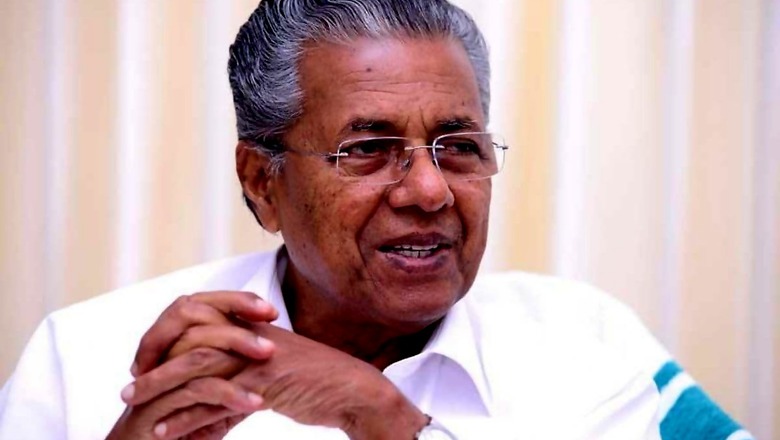
views
With only 25 days to go for the April 6 polls to elect 140 MLAs to the 15th Kerala State Legislative Assembly, the lead camps of the Left Democratic Front (LDF) and the United Democratic Front (UDF) could not have chartered different routes to making their first move—zeroing in on respective candidate lists. While the Communist Party of India-Marxist (CPM) has gone about the exercise in a typical no-nonsense style, the Indian National Congress (INC) has taken a somewhat surreal route with most of its leaders camping in Delhi for protracted negotiations.
Crossing the first hurdle
For the Congress, the problem of plentiful aspirants assumed epic proportions as the primary list had five prospective candidates in 70 out of its assigned 91 seats, with manoeuvring space for 95. Interestingly, the CPM had contested on 92 seats in the 2016 Assembly election. Though it had 11 allies even then, the difference this time is the blockbuster entry of the Kerala Congress (Mani) or KC (M), which is contesting in 13 constituencies.
Meanwhile, the continued state of fluidity within the Congress ranks has been reflected in the delay in announcing the lists by its major allies too—Indian Union Muslim League (IUML), which has been promised a minimum of 27 seats, and Kerala Congress (Joseph) whose share in the spoils now likely stands at 10. But things could change once the Congress final list that has now been put off till Friday evening is out.
The giant candidate list has been a time-tested ploy to accommodate multiple power centres that are at play in the Congress. Contrary to what the party’s once-upon-a-time spokesperson and confidant of 10 Janpath P.C. Chacko said while announcing his exit on Wednesday, there are not two but three power centres. Apart from the factions led by former Kerala Chief Minister Oommen Chandy and opposition leader Ramesh Chennithala, the third power centre is operating from the AICC headquarters, pushing in its quota.
ALSO READ| ‘No Democracy Left’: Kerala Congress Leader PC Chacko Sends Resignation to Sonia Gandhi
Curiously, all this is happening when the Congress has the luxury of 11 seats that it would have otherwise given to KC (M) that has crossed over to the LDF. It is another matter that it has allowed itself to be persuaded by KC (J) to part with six more seats but the Congress is still in the black with five additional seats to play around with. The number of alliance partners has shrunk from eight in 2016 to six now. Unlike in the CPM, almost all its 22 sitting MLAs are likely to be retained.
Even as the UDF, with only six partners, is taking its own sweet time for candidate selection, there is no such tardiness in the LDF camp. On Wednesday, the CPM announced 83 out of its 85 designated candidates, putting the onus on its allies to announce their candidates and start campaigning at the earliest. The CPM once again led by example, kicking off campaigns in many constituencies on Thursday, creating a buffer for extra campaign time against both the Congress and the BJP.
The BJP, apparently, is waiting as the Congress keeps pruning the long list, pushing out failed aspirants into the market. This time, the BJP is pinning its hopes on getting a few popular names from the mainline political parties to spruce up its candidate list—the likes of E. Sreedharan and a few others, including former bureaucrats and film actors. Incidentally, the BJP has decided it is better to contest on more seats, from 98 in 2016 to 114 this time round, which is way above the CPM and the Congress’ tally.
Unlike the UDF, which needs to figure out the permutations and combinations of only a six-member alliance, the LDF has thrown a much tougher challenge at its coalition management to ensure the peaceful co-existence of 11 alliance partners. Yet, the task of carving out 13 seats for new entrant Kerala Congress (Mani) has been handled deftly by the LDF. The CPM has yielded seven seats from its own kitty while taking away six from its many allies.
The number of candidates fielded by the CPM, therefore, shrank to 85, which includes nine Independents backed by the party. The list of 83 candidates released on Wednesday has 74 party candidates and nine Independents; it left out 33 sitting MLAs, including five ministers. On the flip side, the CPM is fielding 33 fresh names, although the number of women candidates remains constant at 12.
Sure, dissidence is nothing new in elections but with all the political criss-crossing and one-time foes becoming uneasy allies, this time both the UDF and the LDF will be mindful of losing seats if they fail to find urgent answers to uncomfortable questions raised by their own rank and file. And for the Congress, particularly, keeping its many factions, pulling in different directions, together is going to be a mighty task.
UDF vs LDF Campaign
Unlike the Congress, the CPM has only one leader—Pinarayi Vijayan—and he seems convinced the LDF government led by him deserves a continuation of governance. And, he is not beholden to the CPM central committee for any clearances on candidate selection or anything else, for that matter.
ALSO READ| Chennithala Accuses Kerala CM Vijayan of Violating Poll Code
Now, it is the calculated position of the CPM leadership, particularly Pinarayi Vijayan, that not one in the long list of charges mounted by the Opposition in the state Assembly or elsewhere will hold sway in the minds of the voter, come April 6.
The UDF ammunition against the LDF government:
* The allegations that led to the exit of three ministers in the first two years of its rule.
* The Sabarimala women entry order by the Supreme Court that was handled rather crudely and with unseemly haste, leaving a bad taste for the staunch devotees of the famed hill shrine. Sabarimala will be an election issue, especially after the UDF draft bill announcing all violations against temple traditions a crime.
* The penchant for the CPM leadership to hold hands with foreign consultancies and push ahead with ill-conceived joint ventures with foreign firms only to face public outcry and exit them in a hurry.
* A string of custodial deaths leaving an image that the CM is not fully in charge of the home department.
* The unsavoury involvement of Chief Minister’s Principal Secretary M. Sivasankar with the gold smuggling and hawala rackets run by his alleged protégé Swapna Suresh and gang, leading to the arrest and incarceration of both, with the former getting bail after 98 days in jail.
* Central investigative agencies summoning minister K.T. Jaleel, Speaker P. Sreeramakrishnan and Chief Minister’s Additional Private Secretary C.M. Raveendran for questioning in the gold smuggling case, thereby hinting at involvement of more powerful people.
* The resignation of CPM state secretary Kodiyeri Balakrishnan citing health issues, following the arrest of Bineesh Kodiyeri in a narcotics case; the latter continues to be in jail.
* Allegedly allowing backdoor entry to party sympathisers in government jobs, bypassing hundreds of eligible candidates who await appointment after clearing the Public Service Commission tests.
* Allegedly tried to sign away the fishing community’s future by entering into a tie-up with the Indian subsidiary of a US company for deep-sea fishing.
The LDF response:
*Its positioning as a government committed to a welfare state, underlined by a variety of pensions to the underprivileged. By taking welfarism to a level often seen in neighbouring Tamil Nadu, it was able to take away the shame of accepting freebies through food kit distribution in the wake of Covid-19 which had put financial pressure on several households.
* Making affordable healthcare a norm, right from community health centres to taluk and district hospitals, and reinforcing the infrastructure of medical colleges to bring them on a par with star hospitals.
* Upgrading government schools to a level where many parents prefer them over private schools for their children.
* The efficient handling of Ockhi victims as the cyclone destroyed lives and property in 2017.
* The alertness shown while providing relief and rehabilitation to victims of floods that ravaged the state in 2018 and 2019.
* The efficiency with which the government tackled epidemics like Nipah and, now, Covid-19.
* The pro-development image it has carved out with the timely execution of infrastructure projects—GAIL pipeline, long-pending flyovers in Kochi, Alappuzha—and an enhanced business-friendly climate.
* A positive public perception through effective handling of the media.
What Taglines Say
The difference in the campaigns mounted by the UDF and the LDF is also reflected in their election taglines. The 2016 Kerala Assembly election had pitted the aggressively assertive “LDF Varum Ellaam Sariyakum” (LDF will come, set right everything) against UDF’s relatively meek appeal, “Valaranam Ee Nadu, Thudaranam Ee Bharanam” (This land must grow, this government should continue). While the CPM-led propaganda machinery went to work totally convinced it would be their turn to rule, the Congress-led UDF seemed happy with putting the onus on the voters to do the needful, as a kind of conditional clause to the continued prosperity of Kerala.
Now, five years on, the central theme of both the fronts remains fundamentally unchanged with the LDF reiterating its conviction of a historic return to power of the ruling coalition, with a catch-line oozing self-confidence that borders on complacency, “Urappanu LDF” (Sure, it’s LDF). The UDF, thankfully, has opted for brevity, yet putting the onus again on the electorate for action with “Naadu Nannakan UDF” (To make Kerala good, UDF).
The BJP is definitely trying to shift gears, moving from the rather presumptuous “Vazhimutti Keralam, Vazhikattan BJP” (Kerala at crossroads, BJP to show the way) in 2016 to the aspirational “Keralam Modikkoppam” (Kerala is with Modi) in 2021, suggestive of what the electorate ought to be doing. One, however, cannot be sure how the central BJP leadership will handle its Kerala leadership if it once again flatters, only to deceive.
This is a first in a 7-part series on Kerala elections.
Read all the Latest News, Breaking News and Coronavirus News here



















Comments
0 comment